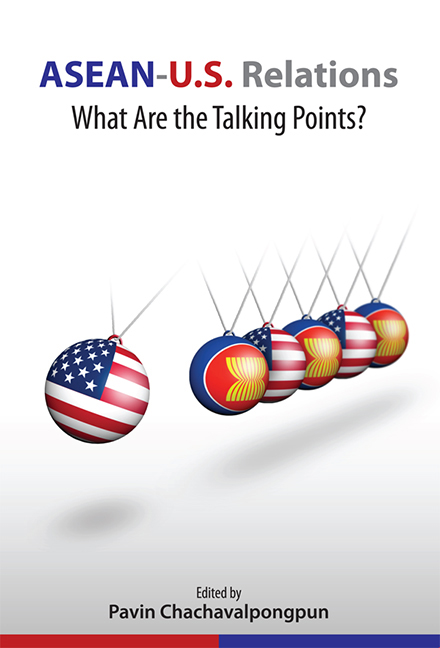Book contents
- Frontmatter
- Contents
- List of Tables and Figures
- Preface
- Contributors
- List of Abbreviations
- OVERVIEW
- QUINTESSENTIAL ISSUES
- 6 A New Era in the Long-Standing U.S.-ASEAN Relationship
- 7 Maritime Security in Southeast Asia and the United States
- 8 ASEAN's View on the U.S. Military Role in the Region
- 9 United States–China Relations
- 10 Shift in U.S. Policy towards Myanmar
- 11 United States Assistance to ASEAN through the ADVANCE Programme
- 12 Conclusion
- Index
11 - United States Assistance to ASEAN through the ADVANCE Programme
from QUINTESSENTIAL ISSUES
Published online by Cambridge University Press: 21 October 2015
- Frontmatter
- Contents
- List of Tables and Figures
- Preface
- Contributors
- List of Abbreviations
- OVERVIEW
- QUINTESSENTIAL ISSUES
- 6 A New Era in the Long-Standing U.S.-ASEAN Relationship
- 7 Maritime Security in Southeast Asia and the United States
- 8 ASEAN's View on the U.S. Military Role in the Region
- 9 United States–China Relations
- 10 Shift in U.S. Policy towards Myanmar
- 11 United States Assistance to ASEAN through the ADVANCE Programme
- 12 Conclusion
- Index
Summary
The United States is deeply committed to supporting ASEAN and its goal of creating the ASEAN Community by 2015. For over thirty years, the United States has been a faithful dialogue partner, working closely with ASEAN to implement a wide range of projects and programmes that have supported growth, security, democracy, and prosperity in the region.
The basis for ASEAN-U.S cooperation is the Joint Vision Statement on the ASEAN-U.S. Enhanced Partnership (AEP) that was simultaneously issued in all ASEAN capitals and in Washington D.C. in 2005. This document sets out the broad goals for the ASEAN-U.S. relationship. It provides for cooperation across all three of ASEAN's pillars to promote an “open and outward looking, dynamic and resilient ASEAN Community”.
To implement the AEP, ASEAN and the United States developed the ASEAN-U.S. Enhanced Partnership Plan of Action in 2006. This document identified specific, actionable programmes that could be implemented to promote the broad goals of the AEP. The first plan of action operates for five years, expiring in 2011. ASEAN and the United States are currently in the process of developing a new plan of action to cover the period from 2011 to 2016, to be finalized in mid-2011. As called for in the AEP, the United States and ASEAN negotiated and signed the United States–ASEAN Trade and Investment Framework Arrangement in 2006 that provides further structure for cooperation on economic matters.
Over the past two and a half years, the Obama administration has sought to further expand and enhance the U.S. relationship with ASEAN. Secretary of State Hillary Rodham Clinton, on her first trip outside the United States as Secretary of State, visited the ASEAN Secretariat in February 2009 and said, “This region is vital to the future of not only the United States and each of the countries, but to the world's common interests.” She noted that ASEAN embodies “a set of countries that will be key to any solutions we pursue on climate change, counter-terrorism, global health, and so much else”.
- Type
- Chapter
- Information
- ASEAN-U.S. RelationsWhat Are the Talking Points?, pp. 112 - 121Publisher: ISEAS–Yusof Ishak InstitutePrint publication year: 2011

